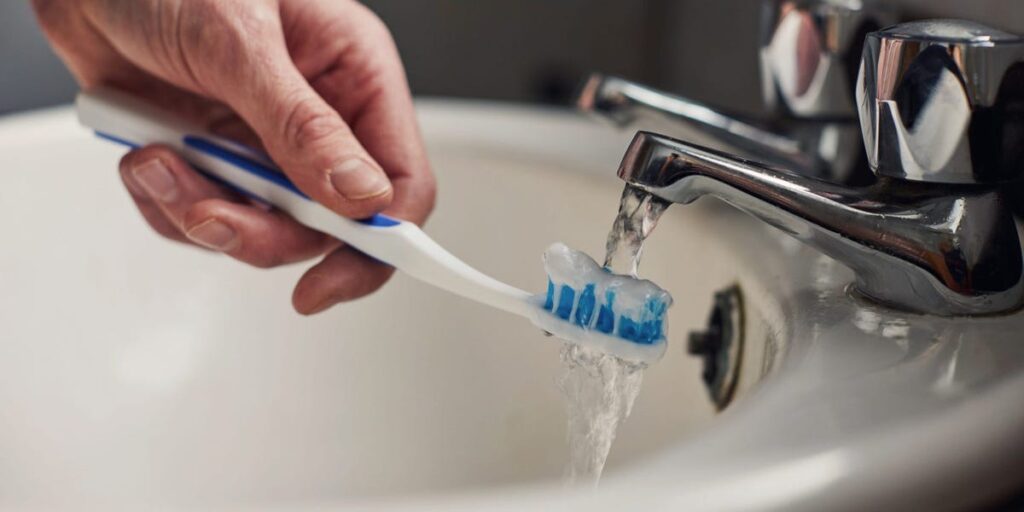- A new study found hundreds of unique viruses called bacteriophage on toothbrushes and shower heads.
- Phage target bacteria, not humans, and could be a useful tool against disease.
- Phage research may spark innovations in biotech to fight antibiotic-resistant pathogens.
The next big breakthrough in disease-fighting innovation could be no further away than your bathroom.
A recent study found hundreds of viruses on samples from toothbrushes and shower heads, including many that have never been seen before, let alone examined.
But this specific kind of viruses, known as bacteriophage, aren’t concerning for human health because they target and infect bacteria, not us, according to Erica Hartmann, a professor of civil and environmental engineering at Northwestern University who led the study.
“It’s still a big deal; it’s just not scary. It’s actually really exciting,” Hartmann told Business Insider.
Understanding how these infectious particles work could be a valuable step in protecting us from harmful pathogens and bacteria, including those that cause tuberculosis and other serious diseases.
“The more we know about what’s in shower heads and what’s on toothbrushes with regard to viruses and microbes, the more we can advance in understanding how we get sick and even devise new tools to fight those pathogens,” Miryam Wahrman, a professor of Biology at William Paterson University of New Jersey who was not involved with the study, told Business Insider.
Unexplored ecosystems are living on your household items
Researchers from Northwestern University were inspired to investigate toothbrushes because of a previous study investigating whether flushing the toilet could release aerosols that might contaminate a toothbrush left out on the countertop.
The good news is that the study, nicknamed “Operation Pottymouth,” found no evidence of poop-related germs on toothbrushes.
“Overwhelmingly, we find that microbes on your toothbrush come from your mouth,” Hartmann said.
The research team decided to put all those used toothbrushes to good use and took a closer look at what’s hanging out there.
In a previous study, they also analyzed samples taken from shower heads to offer even more insight into our bathrooms’ microscopic occupants.
The researchers weren’t surprised to find that these household items were home to many germs because of their warm, moist environments.
But they were blown away by how many different kinds of viruses were present. There was so much diversity that there was almost no overlap between the samples, meaning each toothbrush and shower head was host to its own unique microscopic world.
The findings were published October 9 in Frontiers in Microbiomes.
“I’d encourage people to look at things they see every day and think of these as places where we could be making exciting discoveries for new biotechnology,” Hartmann said.
Phages could be the new frontier in disease-fighting biotech
There’s no reason to be grossed out by the tiny inhabitants sharing our homes.
“I don’t think there’s any need to change behavior or enhance cleaning. These are not viruses that are going to infect you, these are viruses that are potentially cool,” Hartmann said.
It’s a common misconception to think of all germs and microorganisms as potential threats, but plenty of microbes are neutral, beneficial, and sometimes necessary for human health.
Bacteria and viruses have sparked groundbreaking innovations in science, biotechnology, and healthcare that we benefit from every day, such as penicillin and DNA research.
“Microbes are everywhere all the time, and the vast majority of them won’t make you sick,” Hartmann said. “If we approach with wonder and curiosity instead of fear, we can work with microbes instead of against them.”
Phage are exciting because they specialize in attacking and replicating inside bacteria, including bacterial pathogens. These pathogens make us sick and can become resistant to our current protective strategies, like antibiotics.
“The enemy of our enemy is our friend. They are potentially a very helpful tool for us,” Wahrman said.
Researchers have known about the existence of phage for more than a century, but antibiotics have gotten most of our attention. Now that some pathogens have outsmarted antibiotics, phage are a wide-open frontier for innovation.
In the future, phage might be a rich source of biotech innovations like phage therapy, in the same way pharmaceuticals have developed medicines from plants or animals. Rather than scouring remote reaches of the planet, these discoveries could come from digging deeper into what surrounds us every day.
“There are a lot of things waiting to be discovered just under our noses or on our toothbrushes,” Hartmann said.
Read the full article here
















